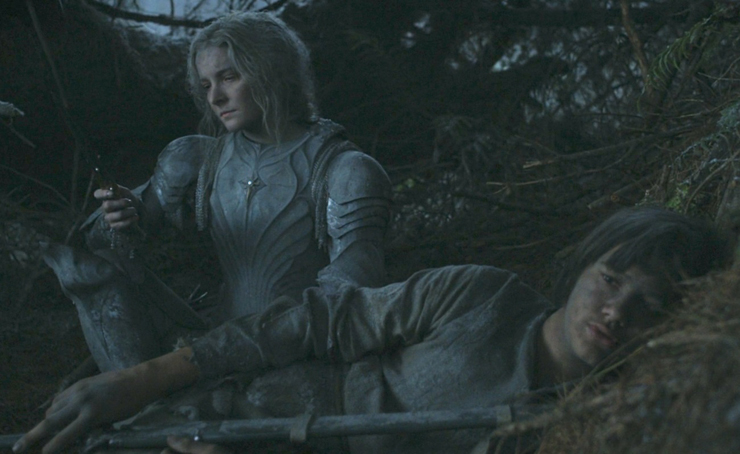Looks like orc-origins are back on the menu, boys! Thanks a lot, Adar, “Lord-father.”
Well, these last two episodes didn’t lack for big movement and bigger drama. Battles, volcanos, tears, way more blood than expected, and even long-lost husbands! We finally have the great war for the Southlands… which, well, didn’t really seem that great, after all. I guess I was expecting a series of campaigns (even if we didn’t walk through them in great detail), not a single skirmish in a small village. Neither the Númenóreans nor the orcs were particularly numerous. Still, it could be argued that the outcome of this battle would determine the future not only of the Southlands, but all of Middle-earth.
Some new revelations have come to light, and I will tackle some of them in the spoiler-filled discussion below.
I still insist that the real challenge in watching this show is knowing too much. If you’re familiar with only The Lord of the Rings and maybe its Appendices, then you might give The Rings of Power a bit of side-eye from time to time. (Really? The Elves need mithril for their souls to not vaporize?) But if you know The Silmarillion and Unfinished Tales, or even more, it’s really going to test you. For book nerds, the show can still work and be enjoyable on a couple of different levels. But there’s just no getting around it: if you’re just a casual viewer with no real knowledge of the books, but still have an interest in fantasy, it probably works on even more levels, because you’re not worrying about what was done differently, what was done badly, or what was reinvented altogether from the source material. It’s so hard to remember this, but this show has a broader demographic than we think it does.
Take Morgoth, or even Sauron himself. In this is a version of Middle-earth, Sauron’s identity, his “race,” isn’t properly identified. He’s just—per Galadriel’s prologue—”a cruel and cunning sorcerer.” Heck, I don’t think they’ve even labeled him a Dark Lord yet. So for the average viewer, Sauron could just be some uncannily powerful mortal Man who’s mastered sorcery and that’s why he’s been around for so long. Hell, maybe he’s some deviant form of Elf. From what we’re given in the show so far, why wouldn’t we think he’s any different than Adar? And the idea that he could be killed, “split open,” well, why not?
But some of us, as book readers, know Sauron’s a Maia, perhaps one of the mightiest. But that never comes up. In fairness, The Lord of the Rings itself doesn’t explain that, either. Sauron is the greatest servant of Morgoth, we’re told, but what does that entail? We don’t know. Clearly he’s the inheritor of Morgoth’s legacy, but we don’t learn much more than he was the first big bad guy during the First Age. In the glossary, it literally just says:
Morgoth (Dark Power of the North, Darkness in the North, the Great Enemy) [evil Vala, prime Enemy]
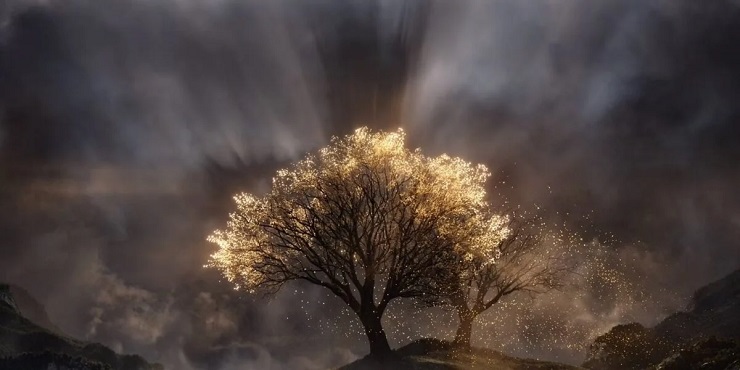
But this show also doesn’t address the true nature of the Elves, either. That is, the “serial longevity” that is something different than just immortality. It doesn’t address it, I guess, because it can’t. Because rights? So when Finrod’s death lights a fire under the show’s version of Galadriel, we’re not told that he, Finrod, is alive in well in Valinor, along with all the other Elves she’s cared about and lost. Because Elves die but they’re not gone, not like mortal Men are when they die. But in The Rings of Power, Finrod is just dead. Dead and gone. And even the prospect of sailing to Valinor never seemed to prompt Galadriel to think, “At least I’ll see my brother again.”
Just as bad, though, is not mentioning that it was their envy of the Elves and their fear of death that has led the Númenóreans to their anti-Elf stance at this point. It seems important. So when will we get that? Will we get that? Or will the writers and showrunners give us a new reason for Númenor’s eventual fall, one that is simpler and more accessible to a wider audience?
Well, let’s recap first.
Episode 6, “Udûn” — Adar gives his orcs a pep talk, which is something we’ve never seen before in any book or adaptation. He clearly wishes to inspire them to go commit acts of violence and to dish out some sweet nampat—death, in the Black Speech. When they march on the watchtower of Ostirith, where they think the villagers from Tirharad have holed up, they step instead into Ardondir’s Jenga-tower trap. I have to say, it seems an inconsequential number of orcs are removed from the equation here, given how much of a threat they later remain. Lucky for the forces of evil, the crumbling tower doesn’t bury the old sculpture that later turns out to be intrinsic to the future of Mordor! Off screen, Adar surely wipes his brow with a dramatic “Whew!”
Meanwhile, on the open sea, the three Númenórean ships sight land. Isildur shares an apple with his horse, Berek, but only gives him one bite (the monster) before tossing it into the waves. The young man tells Galadriel about his desire to leave what Númenor has become (having fallen so far from the true, faithful-to-the-Elves Númenor of the past), then his father shows up and bums them both out. In Tirharad, the villagers make preparations for the coming orc hoard of indeterminate size. Arondir reappears and helps them, goes to bury the evil sword-hilt somewhere, then shares a moment with Bronwyn, speaking of their future together. Their up-until-now understated romance has a moment of conviction, and a kiss. At nightfall, the orcs attack as expected. Initially they are defeated, but then the villagers discover to their horror that many of the armored and sun-cloak-wearing invaders were actually their own people. A fresh wave of orcs pours forth in an ambush from the woods, and still more villagers are killed; Bronwyn is horribly wounded by arrows and bleeds way more than even Médhor (Arondir’s former partner) did when he had his throat slashed! Dang! Adar has people executed one by one until Theo gives up the sword-hilt to save his mother. I guess he spied on Arondir hiding it?
The Númenórean cavalry finally arrives—unexpectedly!—and saves the day. Adar flees with the bundle that the evil sword-hilt was wrapped in. Galadriel and Halbrand chase him down at Arondir’s prompting. Halbrand skewers Adar’s hand with his spear and they exchange some curious words, then the orc-daddy is made captive. While the Númenóreans ruminate on the state of things, and no one actually asks them who they are (I mean, couldn’t they show at least one curious Southlander asking where they came from?), Galadriel interrogates Adar. He is delusional but holds deep convictions when it comes to his “children,” the orcs, and she guesses that he is one of the original Elves who were twisted to make the orc race. She goes full bad cop as he draws parallels between herself and him, but Halbrand stops her from crossing the line.
After a brief post-interrogation heart-to-heart chat with Galadriel, Halbrand consents to being the king of the Southlands that the people have long awaited—though his “kingdom” seems to amount to a rabble of not so many people and scattered, wrecked villages. Then it turns out that the recaptured sword-hilt was a decoy. Old Waldreg, back at the watchtower, has the real one. He uses his blood to activate the blade, then turns the hilt-key. Thus is triggered the worst Dark Lord reveal party ever.

Except nope, we still don’t know where Sauron is, or who Sauron is. Or if Sauron is. The mystery box lid is still shut, hopefully for only a bit longer. In any case, Orodruin, aka Mount Doom, begins the land’s renovation process with fire, lava, and smoke. The Southlanders and their Númenórean saviors are swallowed by a cloud of smoke and ash, with fire raging all about.
Episode 7, “The Eye” — In the aftermath of Mount Doom’s cataclysmic eruption, the survivors (just how many people are there?) are in disarray, just trying to get by. Galadriel finds Theo and they escape independently from the rest. Isildur helps to save his friend Valandil, but loses Ontamo… before everyone loses him. Queen Regent Míriel helps to rescue some of her people, but gets a face full of fiery sparks in the process.
Far away, the Harfoots reach their destination: the Grove, the remains of an orchard long abandoned but still thriving. Well, normally. Now some of the trees are scorched as if from “fire-rock” spat by a mountain. At the Harfoots’ urging, the Stranger sets to work trying to heal one of the trees, though the fall of a branch nearly injures Nori and her sister. Sadoc, the elder, sends him on his way soon after. He points out the vast forest of Greenwood, which really tells me the Harfoots are far more north than I thought after their journey. Nori gives the Stranger an apple in parting, a final kind gesture and a token of her part in his story. Over in Khazad-dûm, Elrond’s plea for mithril is rejected by King Durin III. Disa fumes and hammers over it, Elrond says “Namárië,” but when Durin IV and Disa see one of the blighted leaves of the Lindon tree healed by close proximity to a nugget of mithril, they are determined to seek more mithril despite the orders of the king.
Now, is that leaf from Lindon or one from Durin and Disa’s home? I don’t know and I feel like that’s an important distinction!
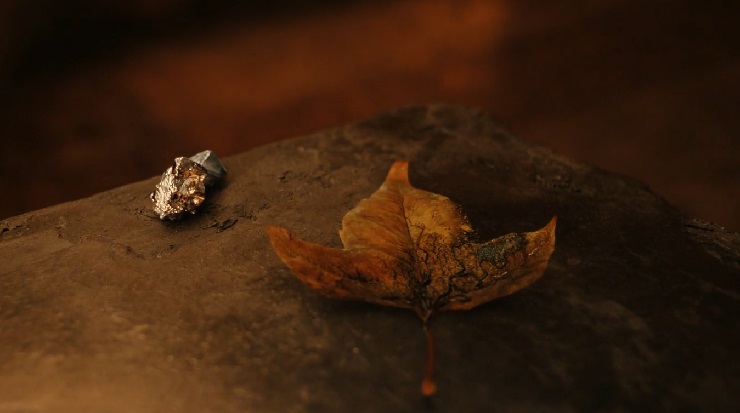
Elendil is reunited with Míriel, but now faces the loss of his son, who the others believe is now dead (most viewers, I think, know better). Later in the episode, Míriel is revealed to be blind—the “darkness” her father warned her about. Galadriel and Theo spend some unplanned quality time together walking out of the ash-filled land. She dispenses the wisdom of her years (though she is still a far cry from her Third Age self) to the boy, and even hands him her sword—a simple gesture in the moment, but possibly symbolic for her character. We never see her demand it back. He is now a soldier, and she is beginning to set aside her sword (but ahh, not her dagger). While Galadriel and Theo hide from orcs that night, she reveals that she “lost” her husband in the war as well as her brother. She names him at last! Celeborn! She’s a wife, after all! But her account also leaves a lot of questions unanswered.
In Khazad-dûm, King Durin III discovers his son searching for more mithril and, after having Elrond thrown out of the mountain, has it out with his son and heir. In the gut-wrenching fallout, III strips IV of his princedom in the heat of the moment (whether it will actually take, or whether King Durin will have second thoughts remains to be seen). The mithril project is terminated. The next morning, the Harfoots discover that the Grove is truly healed now, but the Stranger has already departed. Later, when the three Mystics arrive at night, the Harfoots observe them from a safe distance. Nori, seeing that the big folk are apparently following the Stranger, emerges from her hiding spot and tries to misdirect them. Yet because she revealed herself, the three creepy women respond with sorcery and cruelty. The Harfoots’ wagons, and all that they own, go up in flames. The Mystics then vanish.
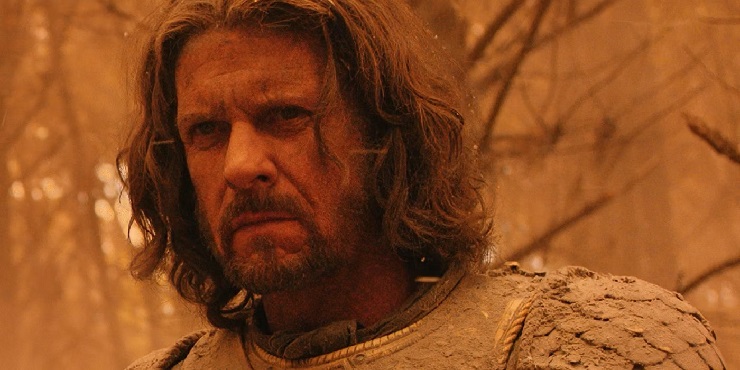
Berek, Isildur’s horse, is let loose to go pull a Brego, galloping off to find and rouse his master, but Elendil doesn’t know this because he hasn’t seen Peter Jackson’s The Two Towers. Galadriel and Theo reach the Númenórean encampment where he reunites with Bronwyn and Arondir amid the horrors of the wounded. Elendil regrets ever bringing “the Elf” aboard his ship, but Queen Regent Míriel vows to return to Middle-earth for vengeance, much to his misery. He just wants to be done with Middle-earth now. In the Grove, while the Harfoots pick among the scorched remains of their caravan, Nori is resolved to go after the Stranger to warn him about the weird stalker witches. After her dad, Largo Brandyfoot, gives an inspiring speech about what it is to be a Harfoot, Poppy, Marigold, and even the fatalistic Sadoc all volunteer to go along with her.
As they head out on a new journey, so too does Míriel depart the shores of Middle-earth on her ship. Bronwyn and Arondir declare that they will seek out Pelargir, “an old Númenórean colony by the mouth of the Anduin.” Galadriel is reunited with Halbrand, the so-called true king of the Southlands, who is oddly wounded in a way that doesn’t prevent him from riding countless leagues to where Galadriel insists he needs Elvish medicine. Whether that’s Eregion or Lindon, it’s unclear, but both sure are far away! In Khazad-dûm, Disa and Durin IV resolve to someday renew the delving for mithril, when they are the king and queen of “this mountain and all others”! The current Dwarf-king, meanwhile, sees the healed golden leaf but then tosses it through the opening of the mine shaft, ordering the tunnel sealed.
Buy the Book
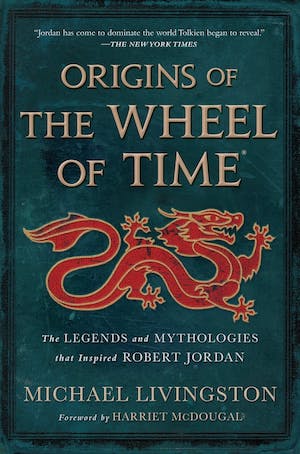

Origins of the The Wheel of Time
But not idly does the Lindon leaf fall. It guides the camera eye deep down the mine shaft, far, far below where the mithril waits in luminous veins, and finally reveals everyone’s favorite long-awaited Balrog. Fortunately—and only if I’m reading this right—he’ll not be coming up anytime soon, despite seeming angry about the Dwarven king’s wanton littering. I’m hoping this moment was just the show’s way of saying, “Don’t worry. We’ve been messing with you. We know he’s not supposed to be unleashed until the year 1980 of the Third Age, millennia from now, and when he’s awakened at last (as we all know he will be), it’ll by the deep delvings of Durin VI, not Durin IV. Delving ‘too greedily and too deep’ and all that. We’re just letting you know that we know that, and so he’ll stay put for now. We wanted to show you the bullet that the Dwarves dodged, for drama’s sake. See? Despite our wanting you to sympathizing with Durin IV and Disa in the moment, grumpy old Durin III is actually the wise one here. The Dwarves will stay safe for now.” But maybe I’m hoping too much?
But the real end of the episode isn’t with a cranky Balrog. It’s with Adar, whose spear-inflicted hand wound doesn’t seem to be bothering him anymore. He seems to have gotten all his hit points back; clearly ancient Elves heal fast. He’s reunited with some of his orcs (just how many are there?!) and now he bids them cast away their sun-cloaks. When Waldreg—wait, that’s Waldreg, he’s still alive, too?!—calls out, “Hail Adar, Lord of the Southlands,” Adar corrects him. It’s not the Southlands anymore. “What shall we call it instead, Lord-father?” the man asks. Adar only starts to smile, just barely. He doesn’t answer. Instead, the ever-helpful location-naming software (that has been labeling each new realm whenever the map pans over to it) gives us the new name.
Now, I just want to talk about a few specifics.
Balrog: I actually don’t mind how his reveal went down, as long as this is it. (I know, it might not be all there is to it. Maybe there’ll be more.) Fans of Jackson’s films who don’t know the books will remember the Balrog well enough but they don’t know how he got there. So maybe this was a bit of film-based fan service for them. Then again, doesn’t it raise more questions if you don’t know the backstory? It’s the deeper-lore readers who know where Balrogs came from, why that one was down there, etc. So was this glimpse of Durin’s Bane just a bit of fan service for book people? Who knows? That a Balrog featured in the “Roots of Hithaeglir” myth, atop the mountain, doesn’t exactly clarify the situation.
Celeborn: While I was happy to learn that he already exists, and that they’re already married, I found myself immediately wishing we’d had some hint of this already. Galadriel hasn’t seemed like a grieving widow in the least, only a grieving sister. So, Celeborn marched off to war without her and is now “lost.” Which has to mean presumed dead. If Galadriel thought he was still alive, surely she’d more fired up to find him than she is about gunning for Sauron? It’s a little alarming that the death of her brother is the reason for her vendetta, rather than one of the reasons for her vendetta. So the question is, are Celeborn’s whereabouts meant to be the next mystery box? Either we’ll get something more about him in the season finale or he’s a mystery box for future seasons. Poor Celeborn. I liked the “silver clam” line, because of its teasing tone; it hints of real affection, of a give-and-take marriage. But on the other hand, the fact that Celeborn’s existence only came to light in this offhand manner seven episodes in feels like cheating on the part of the showrunners. I don’t know this, but I suspect Morfydd Clark herself was not made aware that the character she’d been portraying for who knows how many hours before shooting that scene was supposed to be married already. Not until they filmed this scene.
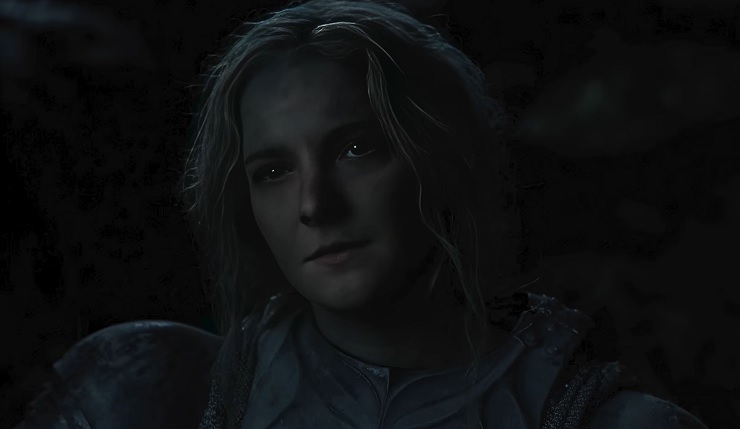
“We met in a glade of flowers. I was dancing and he saw me there.” Look, I know this is meant to be romantic, and to a bunch of people who don’t know the books who legitimately are enjoying the show, I think it works well. It’s an oh-so-brief moment where the viewer can imagine grim Galadriel in a more serene or carefree manner for once. It’s nice. But to me, it’s also another fourth-wall-breaking Easter Egg, as to book readers it’s meant to invoke Beren first spotting Lúthien as she danced “upon the unfading grass in the glades besides Esgalduin,” and in turn invoking Tolkien’s own moment with his wife, Edith, as she danced among hemlocks near Yorkshire. I like Galadriel, even this version of the character, and I still can’t wait to see her full arc in this show, but this allusion feels unearned. Very little homage is delivered by giving this same meeting setup to Galadriel and Celeborn. I would have loved, instead, something else interesting, something Tolkien hadn’t invented. I mean, he never wrote how these two lovebirds met. Wouldn’t it have been interesting to have something… new? So much about this show is delving into new territory. Why not in moments like this?
Disa’s Forge Room: Why yes, I think everyone should have a forge-room in their home, not so much about crafting metal objects as a suitable place for venting one’s anger. Brilliant. I know my wife would love one.
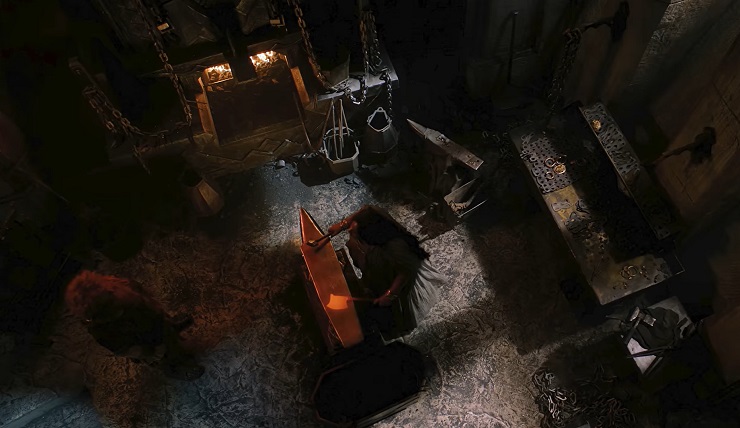
Durin III: I found the confrontation between father and son over mithril and the fate of the Elves satisfying. It hurts, as it should, because those are some heavy words these two stubborn Dwarf-lords are throwing at each other. We, the viewers, are with the young Dwarf prince, and we get mad at the grumpy old king. We share some of Disa’s anger as well (even if she is beginning to sound disturbingly ambitious). Sometimes our elders seem like they’re just being obstinate or unaccepting of change. But, but, there is more going on here. Durin III’s talk of his son’s birth, and his frail early days, of looking upon the “naked face” of baby Durin, I found to be riveting. I love the image of a gruff Dwarf king holding a baby by the fire in the hours of night, not because it seems counter to stereotypes but because it feels right. The bonds of family are emphasized here, and it’s as masculine for a father to hold his infant son as it is to mine for valuable minerals.
I like seeing Durin IV and Disa as angsty teenagers, where it’s them against the world, and all their talk of a future when king-dad is gone and they can rule. But the fact is, old Durin III is the correct one at this juncture. Granted, mining mithril will someday resume, and it is supposed to be the source of Khazad-dûm’s great wealth. It’s meant to take a long, long time to unleash the Balrog. It’s not meant to be greed that leads the Dwarves to mine mithril in the first place, only to keep mining it indefinitely. To dig ever deeper for it. I hope we see none of that in this show, though. I think the final fate of Khazad-dûm has been forecast by us seeing the Balrog. That’s enough.
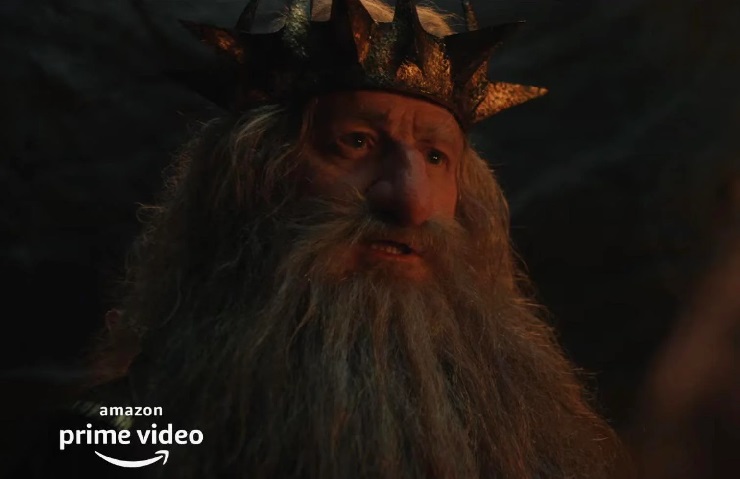
Elrond & Durin IV: The friendship between these two is wonderful, and so they’re still the strongest parts of this whole show. Elrond’s diplomatic position is in such a tangle all the time, through no fault of his own. Even though his honesty is compromised, I lay the blame on RoPer Gil-galad and RoPer Celebrimbor, who are both using him. It rubs me the wrong way, so it sure better be the machinations of Sauron that’s making them dance and cavort like puppets on a string. Still, it’s Durin’s emotions, his rage and his tears, that keep this show engaging. His brotherly love for Elrond is why this show, no matter its faults, is still far and away more wholesome than its contemporaries in the world of prestige TV.
Elves and Marriage: This topic comes up in my mind not only because Galadriel outed herself as someone’s wife, but because Arondir seems to be laying groundwork for settling down with Bronwyn and Theo. I have no trouble with the idea that feelings would grow between a mortal woman and an Elf (like Andreth and Aegnor, from the First Age), as long as it is not ultimately realized (also like Andreth and Aegnor), nor even consummated. Sorrow born from love is legit, and even in Tolkien’s writings there are indications that these star-crossed pairings might have happened from time to time. But the situation is almost always a tragedy. As it would be between two people when one dies while the other lives on, and on.
This is a subject I care a lot about, but I know that not only is it book lore, it’s deep History of Middle-earth series book lore. It’s dealt with most prominently in Morgoth’s Ring, volume 10, and I’ve explored these subjects before:
- Tolkien’s Elves: How the Eldar Half Lives (and Lives and Lives)
- Tolkien’s Elves: Married with Eldar Children
But it boils down to the fact that it is in the Elves’ nature to choose one mate. Once united, it’s forever. Even if one’s spouse is slain in body, the marriage holds, and if both are in Valinor, they will be together no matter what, until the world itself is ended. If they are separated by physical death, then their separation is going to be a physical one only, long in the suffering, but it will go on. Arondir, thus, cannot simply have a human wife and then, when she inevitably dies in a few weeks (or what seems like weeks from his point of view), find another wife some other day. That’d be it for him. Now, is The Rings of Power beholden to this Elf-lore from other books? No, probably not. But if the showrunners want to respect the ideals of Tolkien’s world, they ought to tread carefully here.
There are some who theorize that Theo is somehow Arondir’s kid, too (despite his rounded ears). I don’t buy it, but even if they went there, it would be all the worse. And worst of all would be the shade that would throw on Arondir. It would reveal him to be a deadbeat dad, not acknowledging his own son, letting the boy grow up even this long without knowing the truth. That’s not very Elvish. And that would be a shame, as Arondir is still this show’s most Elvish-acting character.
Galadriel: I still accept this version of Galadriel, contextualizing the character in this Middle-earth quite apart from Tolkien’s own ideas for her. Yet I’m tired of so many people saying she’s too angry. She may not be 100% consistent with what she says and does—yes, she is fiercely hypocritical and flawed—but I honestly feel that her assertiveness and vengeful demeanor would be either applauded or overlooked if she were a male character, at least by a significant portion of these same critics. Some of her dialogue is awkward (but not only hers), and some of it’s great. “What cannot be known hollows the mind,” she tells Theo, and I can relate to that very much. Not knowing things is frustrating, and when you don’t know something you replace it with horrors often worse than reality.
In any case, this episode may have seen her beginning to soften: Giving Theo her sword, telling him that “it darkens the heart to call dark deeds ‘good,'” realizing that one shouldn’t try to find joy in the slaughter even of one’s enemies. Well, we’ll see if she follows her own advice.
Mordor’s Reveal: Some found the removal of “The Southlands” and its replacement with “Mordor” as cheesy. Some didn’t like that Adar didn’t get to say it out loud. I actually like the way they did it. First, remember that those who’ve not read the books might not have seen this coming as the rest of us did a mile away. Mordor they will remember from the Jackson films, and now the visual link has been made. But also, if Adar had answered with Mordor, like he’d already worked up the name in Sindarin (which would be odd, considering his preferred use of Uruk comes from the Black Speech), then it would just be another overdramatic set-up line.
Like, “What is this place?” “There is only one place it can be… the Land of the Star… the westernmost of all mortal realms… the island kingdom… of Númenor.” And while it was drawn out a bit much, that one wasn’t too bad. But movies and shows love doing this, sometimes too much.
I think back to The Hobbit: The Battle of the Five Armies, with Legolas and Tauriel hiding on out outcrop of rock, looking down at Gundabad. “These bats are bred for one purpose,” he says. “For what?” she asks, truly and unreasonably unsure of the answer. “For war,” he says dramatically, the camera close up. I cringe at obvious set-up lines like this, where someone asks a question for the audience’s sake, not their own. I’m glad Adar kept his mouth shut. He stays more believable.
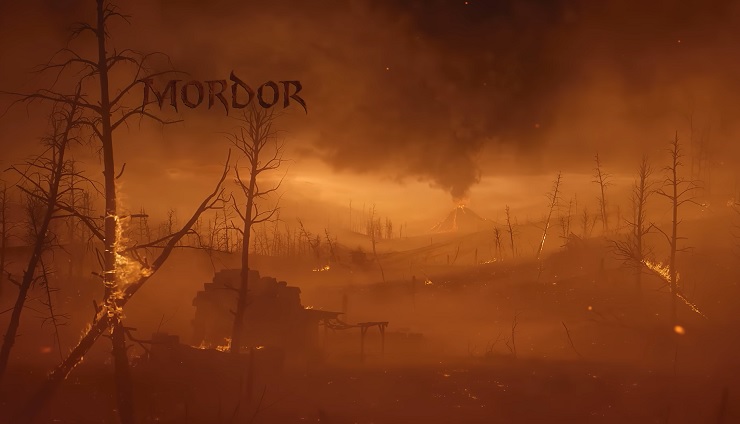
Mystics: I have so many questions! Is their allegiance to evil Sauron-specific, or are they some remnant of the Morgoth worship of old? There have been theories about them, but most don’t make sense to me. I don’t think they’re living Horcruxes of Sauron. I don’t think they’re the three “wolves” we saw before, as werewolves in Middle-earth aren’t really shapechangers to begin with. Moreover, the trivia provided by Prime Video reads:
There are tales of those of Mankind who have learned to conjure sorceries from the Dark Power—a far cry from the enchanting arts of the elves, which are done without malice or deception.
Why point out how sometimes mortals can wield magic if these three are not three such mortals? It sets a precedent for other users of sorcery, like the Mouth of Sauron. We need more like this in this show; it stems from actual Tolkien book lore.
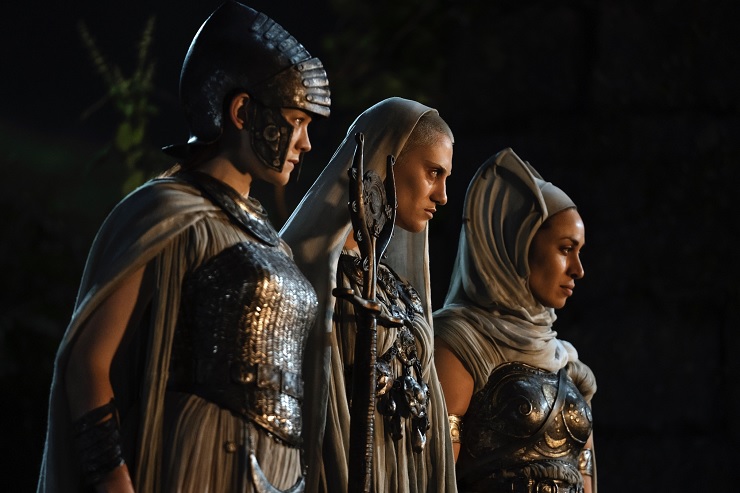
No matter what, they’re intriguing. I do like that they’re creepily silent. And while they’re cruel, they’re not merely devoted to dealing death. They have an agenda, and it certainly involves the Stranger. While they could have flung fireballs at the Harfoots, they didn’t. By destroying their livelihood and their homes, the Mystics demonstrate both the heartlessness of their master and the very flaw that will someday result in Sauron’s final end: overlooking the resolve and pluckiness of smaller folk. Thinking them inconsequential. Hopefully Nori and her friends will do more than merely bearing witness to events, but play some seemingly small, active part that will have a rippling effect. At the same time, I also don’t want their final actions to upstage Frodo, Sam, Pippin, and Merry. It’s a careful line this show needs to walk.
While the name Mystics hasn’t come up in dialogue, I do wonder why the show has given them this label. The Mystics of The Dark Crystal might want a word, though.
Orcs: Adar goes from murderous would-be god to bleeding-heart philosopher when Galadriel interrogates him. Although he gets under her skin and brings out the worse in her—reminding us, maybe, of her “in place of the Dark Lord you would set up a Queen” moment in the distant future—he also tries to get us to feel bad for the orcs. He cares about them, or so he seems to suggest (despite not flinching when they are cut down or buried under rubble). Oh, he “killed” Sauron, did he? He did this, so he claims, because Sauron sacrificed too many of Adar’s “children” in his experimentations with the unseen world. Here I again must forcibly push aside The Silmarillion, where Sauron was already a master of phantoms in the First Age, and remember that this show may be reinventing who Sauron is and what he can do.
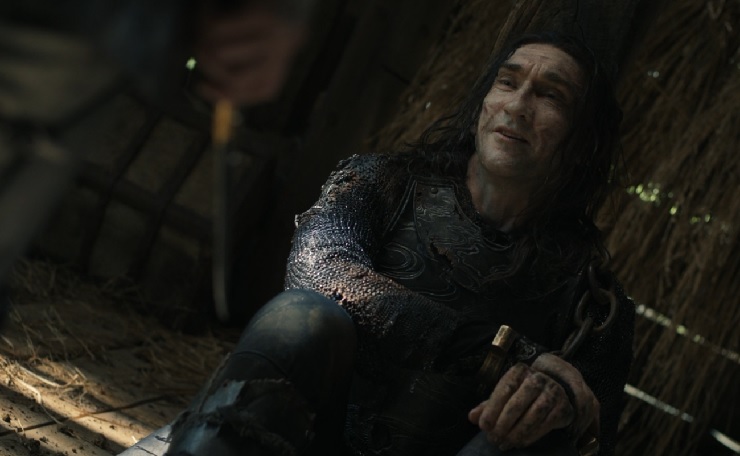
The Rings of Power is leaning into the orcs-were-made-from-Elves approach that The Silmarillion (and Jackson’s films) committed to. And that’s fine. I have written elsewhere about Tolkien’s extensive history of changing his mind about orcs and of the moral quandary he placed himself into by inventing them. I think it’s fine for the show to explore some of the questions worth asking about any race of beings intelligent enough to have their own culture. Adar insists that each of his uruks has a name and a heart, and is just as worthy as Galadriel herself “of the breath of life and just as worthy of a home.” But is murdering and enslaving other people to take that home okay? Complex questions, worth asking, but also worth remembering in what context they were said. I only hope the show remembers how The Lord of the Rings itself handles orcs in its future.
For more on this topic, I can only for now recommend three essays where I walked through orc-origins.
- Tolkien’s Orcs: Bolg, Shagrat, and the Maggot-folk of Mordor (orcs from The Hobbit and The Lord of the Rings)
- Tolkien’s Orcs: The Din-horde of Morgoth (orcs from The Silmarillion and Unfinished Tales)
- Tolkien’s Orcs: Boldog and the Host of Tumult (orcs from The History of Middle-earth series)
***
Well, one episode left now. I am excited, and nervous. I don’t think they’re going to wrap up all the loose strings. Even Sauron’s reveal might not be quite as we want it to be. The question is, will it be a cliffhanger mystery that we can all chew on without going totally bananas? Because it’s going to be a long, long wait until season 2. If nothing else, I’m very excited to see that RoPer Celebrimbor will have a wardrobe change, based on our quick glimpse of him in the trailer.
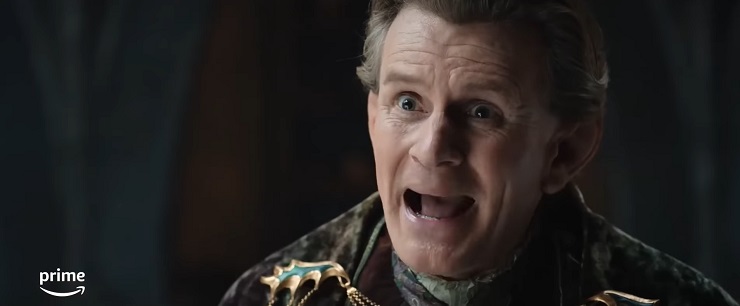
Maybe he’s selected another item from his posh Eregion chambers to strip the upholstery from and wear.
But I admit, at the same time, part of me will be relieved when there are no more big mysteries and reveals pending in the days that follow. We who have gotten caught up in the excitement of a Tolkien adaptation in the mainstream again will be able to catch our breaths…
And then go back to the books, where all is well…
And we can endlessly mine them for their own riddles and mysteries…
And dig ever greedily and ever deeper—
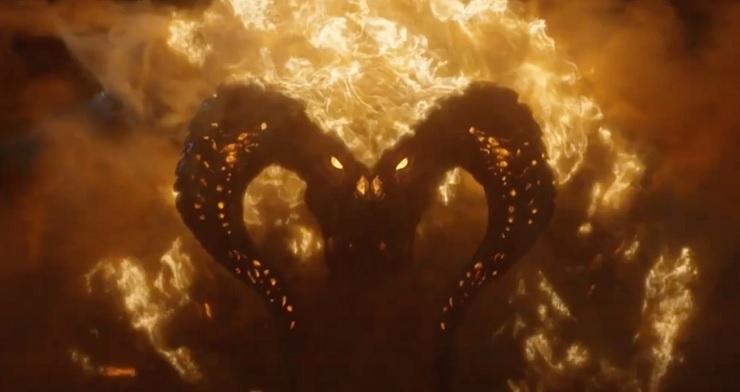
Oh, crap. Right.
Jeff LaSala is responsible for The Silmarillion Primer, the more recent and much shorter Second Age Primer, the Deep Delvings series, and a few other assorted articles on this site. Tolkien nerdom aside, Jeff wrote a Scribe Award–nominated D&D novel, produced some cyberpunk stories, and works in production for Macmillan and the Tor Publishing Group. He is sometimes on Twitter.










